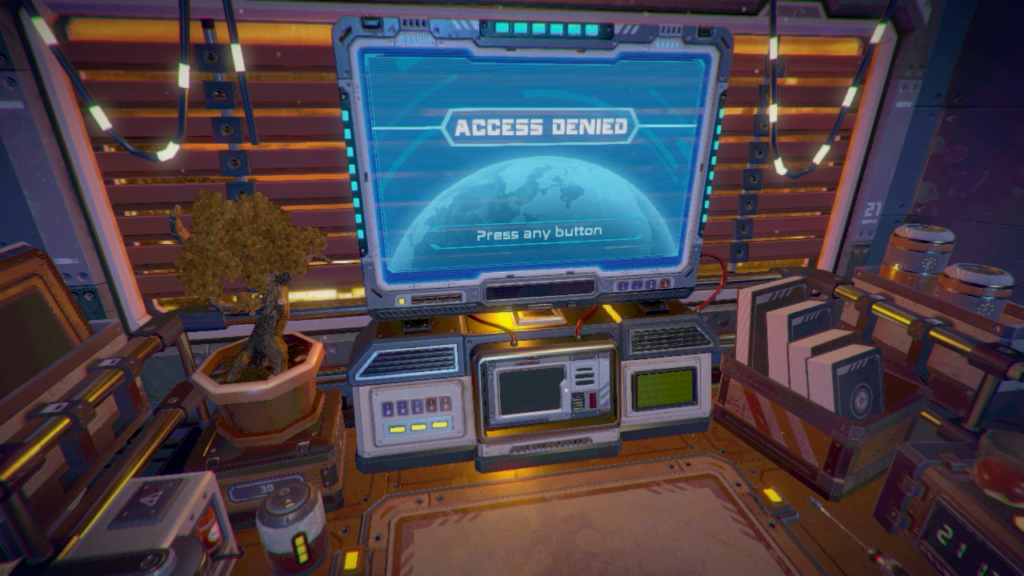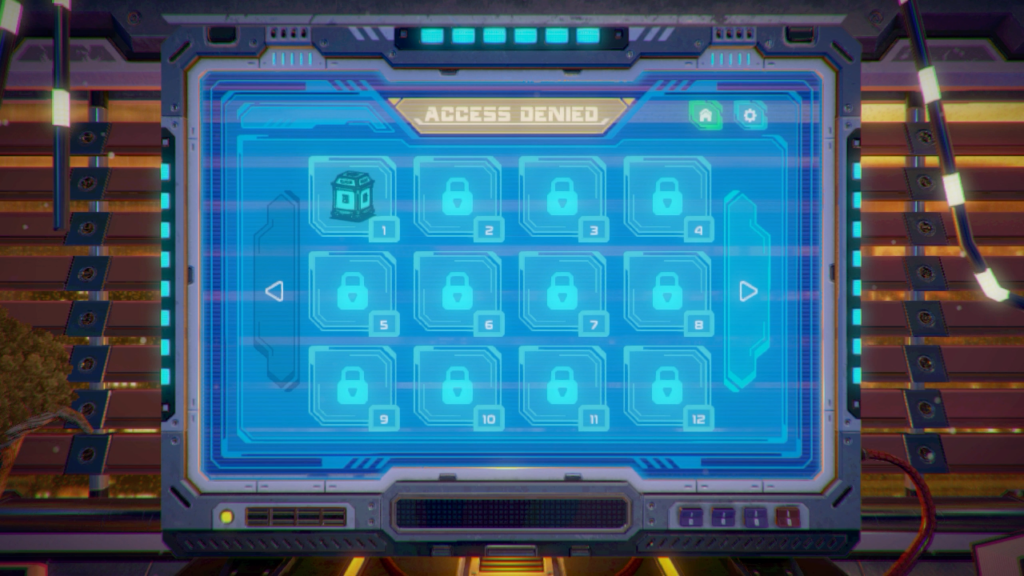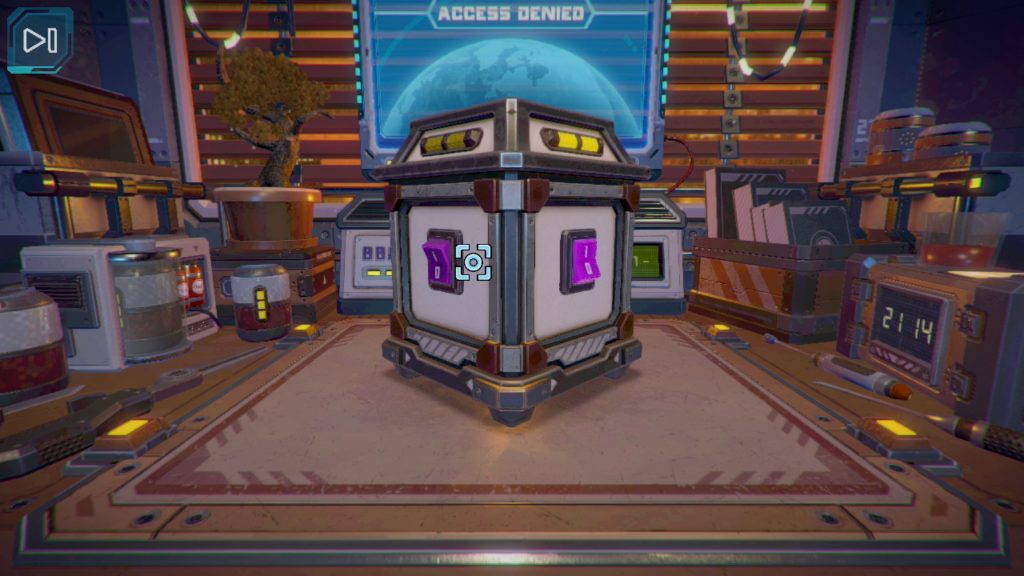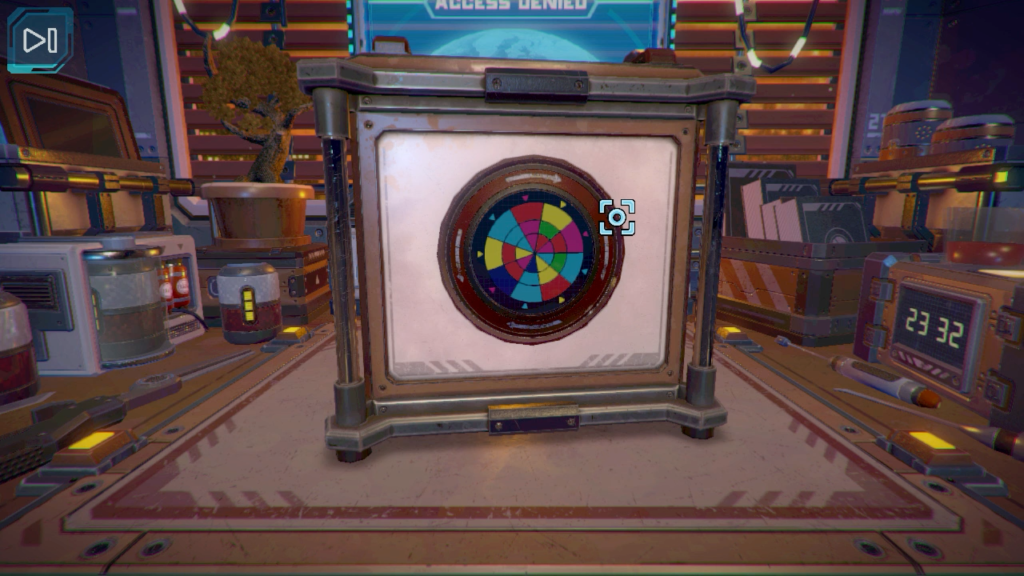In Access Denied I am challenged with opening puzzle boxes which emerge from a trap door in the middle of a workbench. When I open a box, it disappears back into the trap door and is replaced by another. If I can solve all thirty-six puzzle boxes I receive my reward and the videogame ends. It’s a purposefully short and simple experience, uninterested in complicating itself with layers of meaning or mechanics. Access Denied is a videogame where I open puzzle boxes, and sometimes that’s all a videogame needs to be.

Access Denied never really explains what is happening in its world. When I successfully “open” a puzzle box, a holographic blue sphere emerges from its top. The box then retracts into my workbench and is replaced by another.
What do these boxes do? What do they contain? Am I some kind of thief trying to obtain a prize squirreled away inside these boxes? A hostage, forced to solve them before they explode? An enthusiast gifted with challenges by an eccentric genius? Access Denied is not interested in answering these questions.
I could be frustrated that the setting implies some purpose to these boxes and some identity to the formless figure I inhabit while solving them. My workspace seems advanced, made of metal whose earth-toned surface is covered with scars and fading paint. Clearly, I inhabit a well-used space. Objects litter the surface: blades, probes, batteries, multitools, and books. I must be some kind of professional tradesperson, but what trade?

A digital clock glows to my right. It shows the real-world time, a nice touch of verisimilitude that keeps me grounded in the physical world without having to look away from the virtual one. Behind a holographic computer display where I can browse through solved puzzle boxes and adjust volume settings, I see closed shutters. I hear a pleasant drizzle of rain through them, the exclusive soundtrack to my endeavours that is only interrupted by an endorphin-rushing “puzzle solved” chirp.
This place feels real, it feels futuristic, but I cannot feel what it represents. I could be frustrated by this setting. I am not. Access Denied defies context and I accept that its point is to open puzzle boxes. Nothing I infer from its mysterious setting matters.

Each puzzle box has a unique solution. By rotating the box I can examine its different sides and use the cursor to manipulate the various dials, levers, buttons, and displays I find there. Puzzles begin simply. A box with four sides, with four buttons on each side. Activate each button and the box opens. It barely qualifies as a puzzle. Things escalate from there. Differently colored squares occupy a grid and can be slid in the four cardinal directions. But where on the grid should I move them? A digital display shows a figure in a maze and buttons beside it let me move them. But how should I navigate the maze?
I am able to discern the solution to most puzzle boxes by studying the different mechanical devices I can interact with. On a few, clues are etched into the box’s surface by its elusive designer, arcane symbols whose relation to the devices I must deduce and activate in the correct order. Sometimes I must solve a unique puzzle on all of the box’s sides to open it. More often, a simple puzzle on one side will give me a clue I can use on another side, and then on another, and so on.

I am able to solve most boxes in minutes. Others take me as long as half an hour. I would be lying if I said I understood every solution I uncovered. Boxes sometimes spring open after I activate a particular mechanism, my half-formed understanding of the puzzle’s solution clicking into place before my brain fully comprehends the actions my hands are taking. The box immediately disappears, denying me a chance to examine it and recognize the answer I stumbled upon. I confess that on one or two boxes involving spinning dials I resort to brute forcing their solutions, methodically working through every possible combination until the box opens. I am too confounded by the clues to discern their meaning.
I solve all thirty-six puzzle boxes without looking up their solutions online in about three hours. I feel accomplished, if not as smart as I am expected it to be.

Access Denied is simple, short, and cheap. It does not aspire to any greater ideas than how it first presents itself. It does not have a player character. It does not have a twist. It does not have any discernible plot at all. It is a videogame about opening puzzle boxes and there’s something refreshing about that straightforward approach. I cannot truly say I understood the solution to every puzzle I solved but I did solve them all, in one way or another, and I enjoyed the experience. It’s not special or memorable, but it’s an adequate test of my problem solving skills to fill an evening.